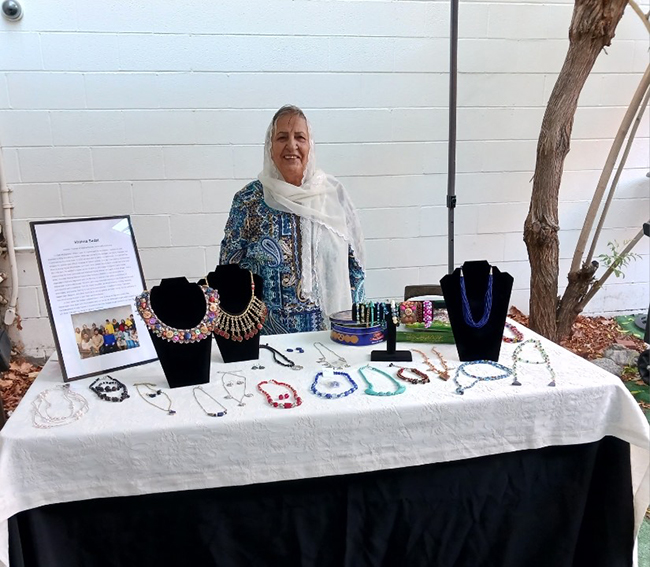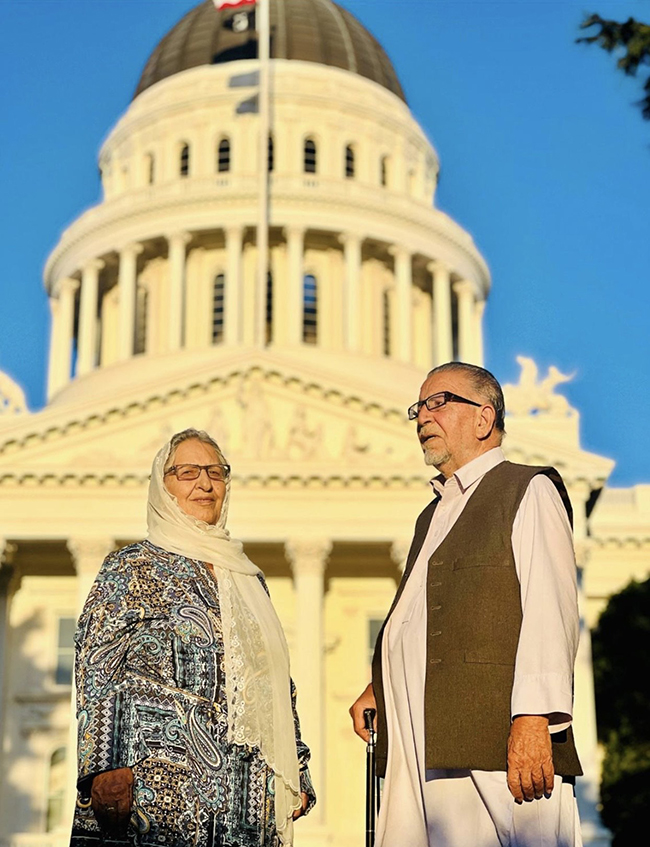My mother, my role model

Merman Shaima Sadat pictured recently at the Local Collective Market in Claremont, where she creates and sells jewelry, donating the proceeds to Afghan women in need. Photo/by Katya Fairbanks
By Nabila Painda | Special to the Courier
In October 1952, in an average house in the outskirts of Kabul in the village of Qarabagh, a girl named Shaima Safi was born.
Some were not pleased with her birth as the third daughter in patriarchal Afghanistan. But her father saw “Shima” as a source of happiness, considering her an “angel of joy,” and loved her dearly.
She grew up with a lush garden, and enjoyed life, like other girls in her village. But her trips to the capital city of Kabul made stark the differences in her life compared to those of her school-aged cousins. Soon her interest in education began to bud in her heart, eventually compelling her father to request the establishment of a girls’ school in Qarabagh. And though the request was granted, no one in the village was willing to enroll their daughter, as at the time it was thought to be disgraceful to send girls to school.
Shima did not lose hope. At 8, still craving the love and affection of her parents, she left home with her uncle so that she could attend school near his home in Kabul. Though her memories of the time are unpleasant, she persevered until she fell ill and had to return home. Her enthusiasm and love for education having grown further, she was deeply troubled to be away from school.
About the same time, another uncle, Mohammad Hashim Safi, visited them from Helmand province. Learning of her love for school, he offered to take her with him. She accepted without hesitation, despite the prospect of again being separated from her parents. She spent the next three years living with her Uncle and his kind family in Lashkar Gah, known as “Little America.” Despite her young age, she excelled academically, passing two grades every year.
She returned home at 13 and like other girls in her village, became engaged. Her betrothed was her cousin, Sayed Mubinullah Sadat, who held a military position. They married a year later and started their new life in her father-in-law’s house in the village of Deh Yahya, near Kabul. Unfamiliar with cooking and household chores, the girl — now with the married name of Merman Shaima Sadat — found living with her husband’s family of 10 difficult.
She was 15 when her first son was born. By 19, she had three boys.
The young family then moved to a house in Qargha, west Kabul. One day her husband came home with his creditor in tow. He was angry because she had spent their money she had been entrusted to save.
His anger forced her into action.
The next day she left the house, determined to find a source of income. She overheard a conversation on the street between two women talking about their work knitting. She struck up a conversation, and before long the women agreed to take her to a knitting workshop in Baharistan, Kabul.
When she returned home, her husband asked where she had been, and she calmly replied that she was looking for work. “What kind of work can an illiterate person like you do?” asked her husband in a mocking tone. But after hearing about her plan, he agreed to help.

Merman Shaima Sadat and her husband, Sayed Mubinullah Sadat pictured earlier this year in Sacramento. Photo/by Nabila Painda
After working at the knitting workshop for a few months, in 1972 she established her own knitting business. She worked at her workshop during the day and brought her machine home at night, where she continued to toil. She had her fourth and fifth children while working tirelessly through the stifling Indian summers and bitter cold winters, shoulder to shoulder with her husband. Eventually they were able to build a house in Khair Khana.
While also taking on most household responsibilities with the assistance of her eldest son, Sayed Nawid, she also both pursued her education and taught girls’ literacy courses.
Due to the difficulties caused by the Afghani civil wars and her husband’s job transfer, the family moved to Kandahar in 1981. There her sixth child, a boy, was born. She continued her work in Kandahar for three years before returning to Kabul, where in 1987 she gave birth to her seventh child, a girl. Her eldest son was married that same year.
Afghanistan’s civil wars made life increasingly difficult, but nothing could stop her from striving to accomplish her goals as a passionate supporter of women’s and girls’ rights.
In 1996 the Taliban took control of Afghanistan and shortly thereafter banned work and education for women. Her 8-year-old daughter was very keen on school, just like her mother, and insisted on getting an education.
Despite the great risk, she started an underground school. But after being injured by the Taliban, she was forced to flee to Pakistan. Since she couldn’t bring her knitting equipment, she began sewing and selling children’s clothes to support her family. By then, many of her children were married with kids of their own. Her eldest son Sayed Nawid, a military doctor, and her third son, Sayed Nabil, a pharmacist, began making kites to help the family. Daughter Maryam, a Persian literature teacher, started doing embroidery. Her second son, Sayed Salim, who was studying economics in Almaty, Kazakhstan, sent money for rent. She made a go at it in Pakistan, but life was grim and rife with challenges.
With the help of Sayed Salim, Sayed Tamim, and Sayed Nadim, she then emigrated to Russia.
With the fall of the Taliban in October 2001, the arrival of the U.S. military, and the establishment of Hamid Karzai’s transitional government, she returned to Afghanistan.
Arriving in Kabul, she immediately understood the dire situation for women, who had been deprived of education and basic human rights for the previous five years of Taliban rule. They had sacrificed for their children, lived like slaves, and told what was permissible to wear, with no choice regarding even the smallest aspects of their lives.
She was compelled to decisive action. Her first attempt to organize to help Afghani women was scuttled due to internal conflict. Then with her daughter Maryam she started Madina Maryam Handicrafts Company. Soon they had established women’s literacy classes and general school training, including courses in English, computer skills, handicrafts, sewing, and even legal information. Many students learned for free.
The women and girls soon began producing handicrafts, and earning a wage by selling the goods at market. This arrangement meant the company was solvent, and the women became financially self-sufficient for the first time in their lives.
After a year part of their handicrafts also included jewelry made from precious and semiprecious stones from Afghanistan, which quickly found markets both domestically and internationally. They and others also established the Afghan Women Business Federation to enhance women’s education, employment, and economic status.
By the mid-2000s, the Taliban was again ascendant. After receiving direct threats from the Taliban, her daughter Maryam was forced to leave the country and sought asylum in Canada. Subsequently, her youngest daughter took her place beside her mother. They collaborated extensively with various government and non-governmental organizations, traveling to many countries and exporting their goods. In 2014, the company sent about 2,000 items to the United States.
Over the years she worked on numerous projects aimed at empowering women with disabilities. She educated more than 5,000 women and girls, with more than 1,000 eventually becoming financially self-sufficient. Her students established more than 100 unions and businesses. She received numerous awards and commendations, including mother of the year and businesswoman of the year. Her family supported her throughout it all.
Eventually, she appointed her youngest daughter as president of the company, and herself vice president. Now, 72, all seven of her children are married, and she has 30 grandchildren, of which nine are married, and 10 great-grandchildren living in the U.S., Canada, Europe, Australia, and Asia.
Her hard work and positive energy were an example for her children, all who are educated and thriving. I know this story so well because I am that once 8-year-old girl thirsting for an education in Afghanistan, the one my mother, Merman Shaima Sadat, later promoted to president of her company.
I am proud of her, and so very happy to share the story of the most significant role model in my life.
Nabila Painda is a Claremont Unified School District para educator and native of Afghanistan. Her mother Merman Shaima Sadat creates and sells jewelry at the Local Collective Market, donating the proceeds to Afghan women in need.







0 Comments